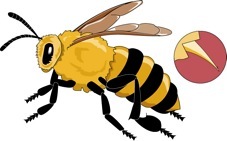-
Skin Conditions





Insect Stings
Signs & Symptoms
-
•Quick, sharp pain.
-
•Swelling.
-
•Itching.
-
•Redness at the sting site.
-
•Hives.
Insect stings can even result in a severe allergic reaction.
Signs of Severe Allergic Reaction
-
•Fainting or decreasing level of consciousness.
-
•Shortness of breath or difficulty breathing or swallowing.
-
•Severe swelling all over or of the face, lips, tongue, and/or throat.
-
•Pale or bluish lips, skin, and/or fingernails.
-
•Wheezing.
-
•Dizziness, weakness, and/or numbness.
-
•Cool, moist skin or sudden onset of pale skin and sweating.
Causes
Insect stings come from bumblebees, honeybees, hornets, wasps, yellow jackets, and fire ants.
Treatment
Self-care treats mild reactions to insect stings. A severe allergic reaction needs immediate care. Symptoms of a severe allergic reaction usually happen soon after or within an hour of the sting.
If you have had a severe allergic reaction to an insect sting, you should carry an emergency insect sting kit, prescribed by your doctor. You should also wear a medical alert tag that lets others know that you are allergic to insect stings. Persons who have had severe reactions to bee or wasp stings should ask their doctor about allergy shots.

Honey Bee.
{Note: Use prescribed medicine, such as an EpiPen, as advised.}






Removing a stinger.

To Treat an Insect Sting Without a Severe Allergic Reaction
-
•For a bee sting, gently scrape out the stinger as soon as possible. Use a blunt knife, credit card, or a fingernail. Yellow jackets, wasps, and hornets don’t lose their stingers.
-
•Don’t pull the stinger out with your fingers or tweezers. Don’t squeeze the stinger. It contains venom. You could re-sting yourself.
-
•Clean the sting area with soapy water.
-
•Remove jewelry from bitten fingers, wrists, etc. It may be difficult to remove jewelry once swelling occurs.
-
•Put a cold compress (ice in a cloth, etc.) on the sting. Don’t put ice directly on the skin.
-
•Hold the cold compress on the site for 10 to 15 minutes.
-
•Keep the sting area lower than heart level.
-
•Take an over-the-counter medicine for pain as directed on the label.
-
•For itching and swelling, apply a topical 1% hydrocortisone cream and/or take an over-the-counter antihistamine, such as Benadryl, if okay with your doctor. Follow directions on the labels. Also, see information on “Antihistamine” use in Your Home Pharmacy.
After an insect sting, do any of these problems occur?
-
•Signs of a severe allergic reaction listed above.
-
•The sting was in the mouth, inside the throat, or on the tongue.
-
•Dizziness, muscle spasms, diarrhea, or vomiting occur with many insect stings. (This is 10 or more in a teenager or adult; 5 or more in a child.)
-
•Hoarseness.
-
•Red, severe hives occur all over.
After an insect sting, do you have any of these problems?
-
•The area around the sting is increasingly red, warm, and/or tender to touch, or reddish streaks extend from the site.
-
•Severe or increased pain or swelling at the site.
-
•Drainage or pus at the site.
-
•Fever.
Do self-care measures not treat symptoms or make symptoms worse?
Self-Care / Prevention
To Avoid Insect Stings
-
•Keep food and drink containers tightly covered. (Bees love sweet things, like soft drinks.)
-
•Don’t wear perfume, colognes, or hair spray when you are outdoors.
-
•Don’t wear bright colors, like white or yellow. Choose neutral colors, like tan or khaki. Wear snug clothing that covers your arms and legs.
-
•Don’t go barefoot. If camping, look for insects in your shoes before you put them on.
-
•Wear an insect repellent, especially if you are sensitive to insect stings.
-
•Be careful when you work outdoors, pull weeds, mow tall grass, and work around shutters. Bees often build hives behind shutters.
-
•If an insect that stings gets in your car, stop the car. Put the windows down. Once the insect leaves, resume driving.
-
•Check for and repair openings in your window screens.
Questions to Ask





Copyright © 2009, American Institute for Preventive Medicine. All rights reserved.